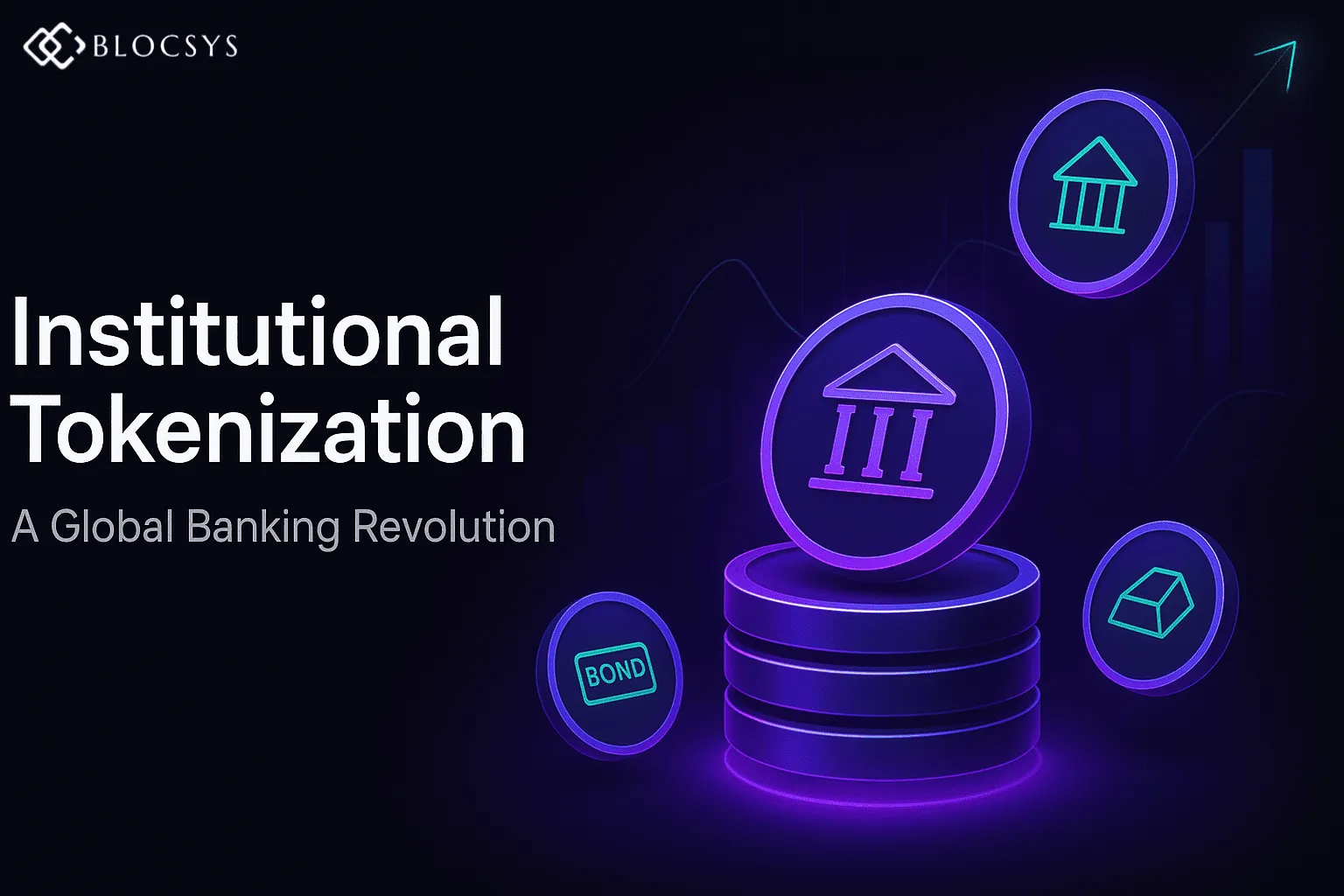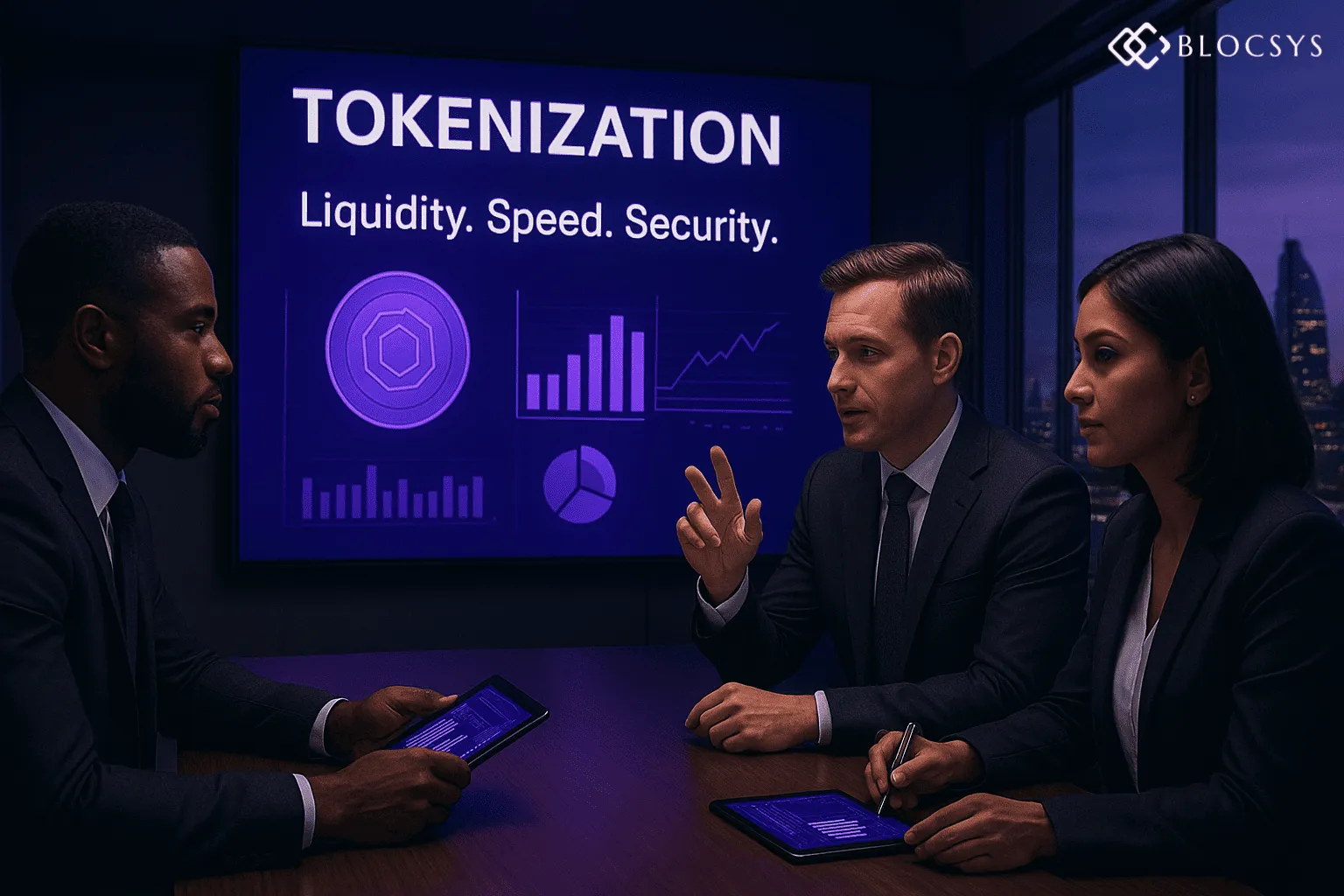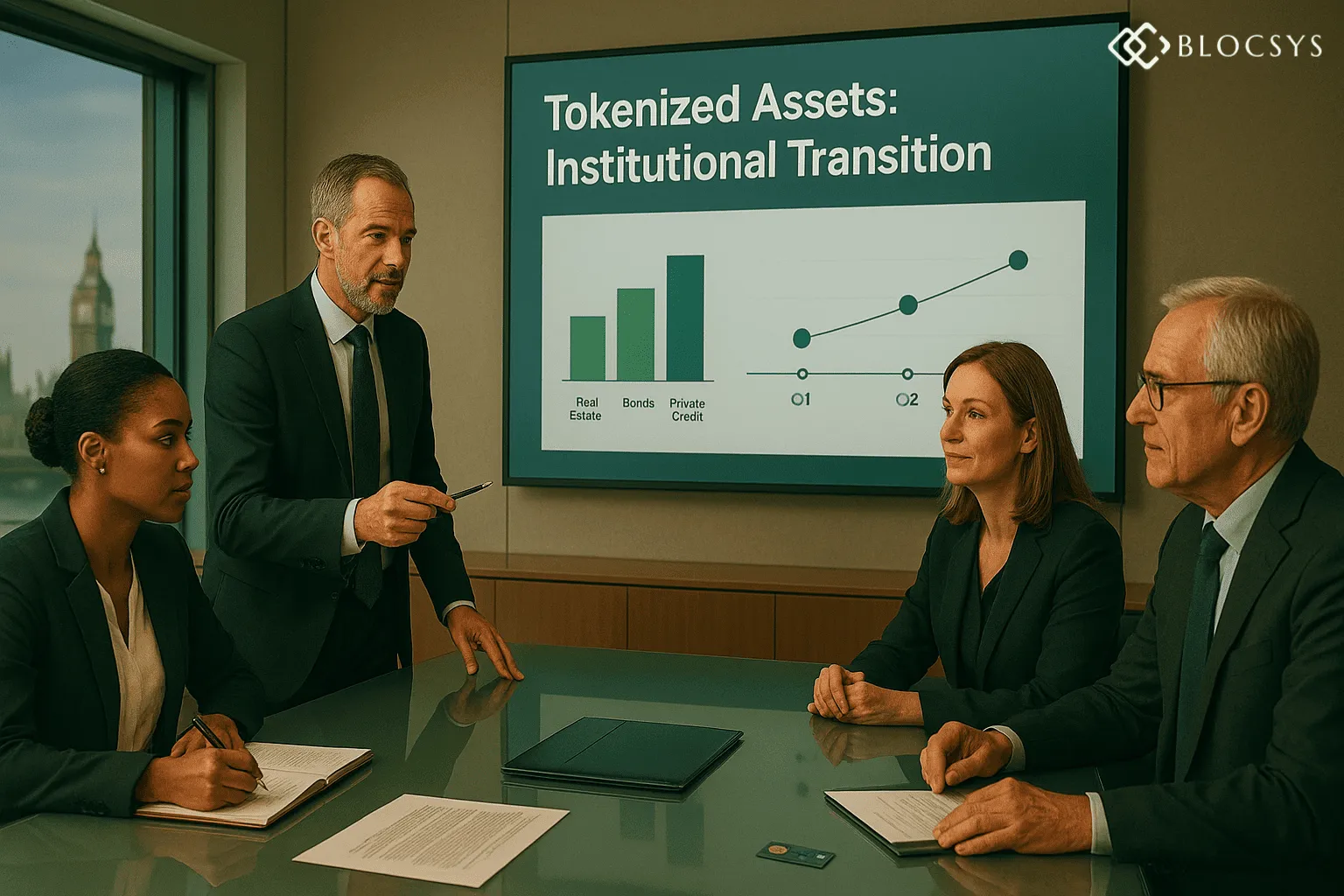Tokenization is transforming institutions by converting traditional assets (such as stocks, bonds, real estate, etc.) into blockchain-based tokens, driving institutional innovation and efficiency in asset management. In essence, it “lets you digitally represent asset ownership for any tangible or intangible asset” on a blockchain. Tokenization shortens settlement periods from days to seconds by enabling almost immediate trading or transfer of assets on distributed ledgers. In reality, tokenized assets provide worldwide access, automated compliance, and fractional ownership features that conventional systems are unable to provide.
A Global Revolution In Institutional Tokenizations
Tokenization is no longer limited to niche projects it’s happening at an institutional level worldwide. Regulatory and financial leaders are actively building token platforms. For instance, the Hong Kong Monetary Authority’s Project Evergreen has already issued the first on-chain green bond and a multicurrency bond using blockchain technology.
Asset managers are also onboard BlackRock and Franklin Templeton have launched tokenized mutual funds, and Bitcoin/Ether ETFs have drawn billions in demand. By tokenizing assets, banks and investors can “fractionalize” traditionally illiquid investments (like loans, real estate or art) into pieces that a broader audience can trade, unlocking new liquidity and revenue streams. In short, institutional tokenizations are enabling banks to “tap” asset values previously locked in the vault a fundamentally new model of finance built on blockchain rails.
Benefits of Tokenization for Banking and Investors
Tokenization delivers multiple business advantages for banking systems:
-
Enhanced Liquidity:
- Breaking large assets into smaller tokens makes even illiquid assets tradable.
- For example, a private equity stake or a piece of commercial real estate can be fractionalized, allowing investors to buy and sell portions.
- This democratizes access to asset classes that were once difficult to reach.
-
Faster Settlement & Efficiency:
- The decentralized ledger of blockchain eliminates multi-day settlement delays and allows for very instantaneous settlement.
- By automating crucial processes like voting, dividends, transfers, and collateral calls, smart contracts lower operating expenses and human error.
- All things considered, banks save time and money by digitizing internal transfers and operations.
-
24/7 Global Access:
- Blockchain networks function around the clock, in contrast to traditional markets that have trading hours.
- On decentralized exchanges, tokenized assets can trade constantly, allowing for worldwide participation without regard to time zone differences.
- For instance, an investor in Europe can trade tokenized U.S. securities anytime, unlocking new market access and efficiency.
-
Improved Transparency & Security:
- An unchangeable audit trail is produced by recording every token transaction on a shared ledger.
- Reconciliation errors and fraud are decreased as a result.
- Digital signatures and encryption, two forms of cryptographic security, guarantee that only permitted transactions take place.
-
Regulatory Compliance Built-In:
- Modern tokenization platforms come with KYC/AML and reporting features integrated by design.
- Banks can enforce investor accreditation, automated compliance checks, and governance rules through smart contracts.
- This ensures that offerings meet legal and regulatory standards across jurisdictions.
By combining these benefits, tokenization positions banks to unlock capital efficiency. The World Economic Forum notes that as much as $255 trillion in securities could become tradable collateral if even a fraction are tokenized a shift that would drastically reduce risk and free up liquidity.
Real-World Adoption and Trends
The tokenization trend has reached a tipping point, with many leading institutions moving from pilots to production:
-
Central Banks & Regulators:
- Governments are actively enabling tokenization.
- The Bank of England is exploring CBDCs.
- In 2024, Hong Kong’s HKMA successfully issued a green bond and a multi-currency bond on-chain.
- Regulators worldwide are crafting frameworks that separate the digital token from the underlying asset, a key step highlighted by experts.
-
Commercial Banks:
- Major banks are trialing token-based services.
- J.P. Morgan has launched a tokenized treasury coin.
- Even community banks could issue tokenized deposits and compete globally.
-
Asset Managers & Funds:
- Institutional investors are tokenizing fund shares.
- BlackRock and Franklin Templeton have launched blockchain-based mutual funds.
- Traditional products like ETFs are going digital crypto ETFs have attracted record inflows.
- Tokenization expands distribution, reduces fees, and enables 24/7 global trading and scalability.
-
Tokenized Bonds and Securities:
- Corporates and governments are issuing real debt and equity as blockchain tokens.
- Goldman Sachs operates an end-to-end blockchain platform for securities.
- The European Investment Bank issued a tokenized euro bond in 2023.
- These issuances demonstrate regulators’ growing acceptance tokenized securities still meet compliance requirements but now use blockchain for efficiency.
These examples show that institutional tokenizations are happening across markets. The World Economic Forum emphasizes that the industry is past theory global adoption is underway and systems are coalescing to support a digital asset economy.
How Blocsys Technologies Enables Institutional Tokenization
To capitalize on this shift, financial institutions are partnering with blockchain technology firms. One such specialist is Blocsys Technologies, which offers end-to-end RWA (Real World Asset) tokenization solutions. Blocsys provides solutions to “build secure, compliant, and scalable blockchain platforms for tokenizing real estate, commodities, art,precious metals and other physical assets”.What sets them apart is its ability to launch a production-ready tokenization platform in as little as seven days, helping clients go to market faster than competitors. The platform is built on the ERC-3643 standard, ensuring institutional-grade compliance, interoperability, and on-chain governance.
Key features of Blocsys’s services include:
Custom Tokenization Platforms:
They develop tailored platforms with investor portals, asset onboarding tools, token issuance modules, and secondary market integration all in one system.
Smart Contract Development & Audit:
Blocsys builds automated smart contracts for payments, transfers and governance, then conducts thorough audits to ensure safety and regulatory compliance.
Blockchain Infrastructure Integration:
They set up the network infrastructure (wallets, nodes, APIs) and connect to multiple blockchain networks. Clients can deploy on Ethereum, Polygon, BSC, Avalanche, etc., optimizing speed and cost.
Compliance (KYC/AML) Tools:
The platform automates investor onboarding: KYC/AML verification, accreditation checks, and ongoing reporting are built in by default. This “built-in compliance framework” means token offerings meet SEC and global standards out of the box.
Secondary Market & Exchanges:
Blocsys enables creating token listings and marketplaces, complete with escrow, order matching and liquidity features. Tokens can be traded on platform-internal exchanges or integrated with external markets.
Ongoing Support & Security:
After launch, Blocsys provides 24/7 maintenance, security updates and performance optimization. They emphasize enterprise-grade security: multi-signature wallets, encryption, penetration testing and audits protect the platform. They have secured their platform with ERC-3643 which stand out them in the competition.
Rapid Deployment:
Thanks to modular “plug & play” components, Blocsys claims it can deliver a production-ready tokenization platform in weeks. This means institutions can join the tokenization wave quickly, ahead of competitors.
By combining blockchain expertise with financial compliance know-how, Blocsys’s solutions illustrate how technology partners enable institutional tokenizations. Banks and investment firms can thus experiment with asset tokenization while relying on proven security and legal frameworks.
Future Outlook for Institutional Tokenization
Tokenization is still evolving, but its trajectory is clear: banking systems will become more digital and asset-agnostic. In the near future:
- Seamless Capital Flows: As systems interconnect, tokenized securities and deposits will sync across platforms and jurisdictions 24/7, creating “seamless capital flows” unbound by time zones.
- Expanded Markets: More assets – from private credit to collectibles – will move on-chain as liquidity grows. Tokens can be used to increase the efficiency of even standard banking operations, such as loans, payments, and trade finance.
- Cooperation on Standards: To make cross-chain finance dependable, industry-wide initiatives (such as the Global Synchronizer Foundation, which is supported by the Linux Foundation) are focusing on governance and protocols.
- Integrated FinTech Ecosystem: Fintechs, DeFi companies, and traditional banks will all co-develop services in the future of banking. While fintechs concentrate on user experience and distribution, banks will use reputable brands to offer tokenized goods (deposits, bonds, and money). Blockchain experts’ safe infrastructure serves as the foundation for everything.
- Regulatory Maturation: It is anticipated that regulators and standards organizations will complete international frameworks pertaining to digital assets. These will make it clearer how tokens ought to be distributed, exchanged, and examined.
In summary, tokenization is ushering in a new banking era of inclusivity and agility. By leveraging blockchain, financial institutions can unlock trillions in asset value, streamline operations, and offer novel financial products.
Real World Uses Cases
1. Tokenized Government Bonds — Project Evergreen (Hong Kong Monetary Authority)
In 2021, the Hong Kong Monetary Authority (HKMA) launched Project Evergreen and issued Asia’s first tokenized green bond, marking a major milestone in institutional blockchain adoption.
- What happened: The HKMA used blockchain infrastructure to issue a multi-currency bond that drastically reduced settlement time from five days to one.
- Why it matters: Tokenized bonds enable instant settlement, transparency, and cost reduction for sovereign issuers, a massive improvement over traditional bond markets.
- Impact: This marks the beginning of government-level adoption of blockchain for capital markets, setting a precedent for other regulators.
2. Tokenized Mutual Funds — Franklin Templeton & BlackRock
In 2021, Franklin Templeton introduced the OnChain U.S. Government Money Fund, marking a landmark moment as the first U.S.-registered mutual fund to operate on a public blockchain.
- What happened: Franklin Templeton launched its OnChain U.S. Government Money Fund, where shares are recorded on the blockchain rather than legacy systems. BlackRock followed with a tokenized money market fund.
- Why it matters: This proves tokenization isn’t theoretical, it’s a reality in regulated investment vehicles.
- Impact: Investors get real-time settlement, lower fees, and transparency, while managers unlock operational efficiency and global accessibility
Conclusion: The Future of Institutional Tokenized
As global finance evolves, tokenization is proving to be more than a technological innovation it’s a strategic transformation for modern banking. Institutions are gaining new efficiencies, liquidity, and transparency that legacy systems are unable to provide by digitizing physical assets into blockchain networks. Tokenization gives financial institutions the ability to function with previously unheard-of flexibility and inclusivity, thanks to features like quicker settlements, 24/7 worldwide access, and integrated compliance.
Tokenization will make it harder to distinguish between traditional and digital banking as blockchain develops and standards become more established, bringing about a more integrated, effective, and democratic financial system. Banks that act now by partnering with experienced blockchain providers like Blocsys will lead the next wave of financial innovation.



